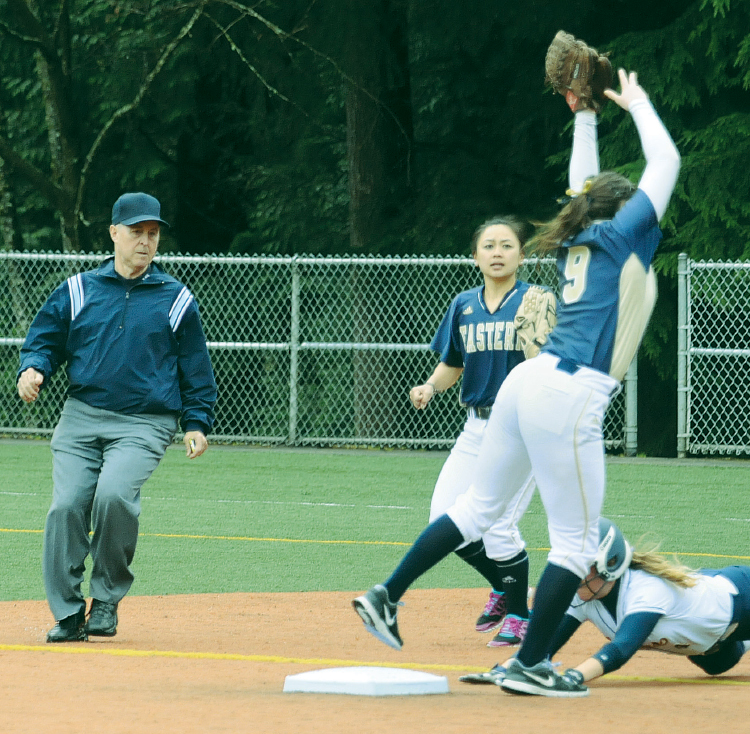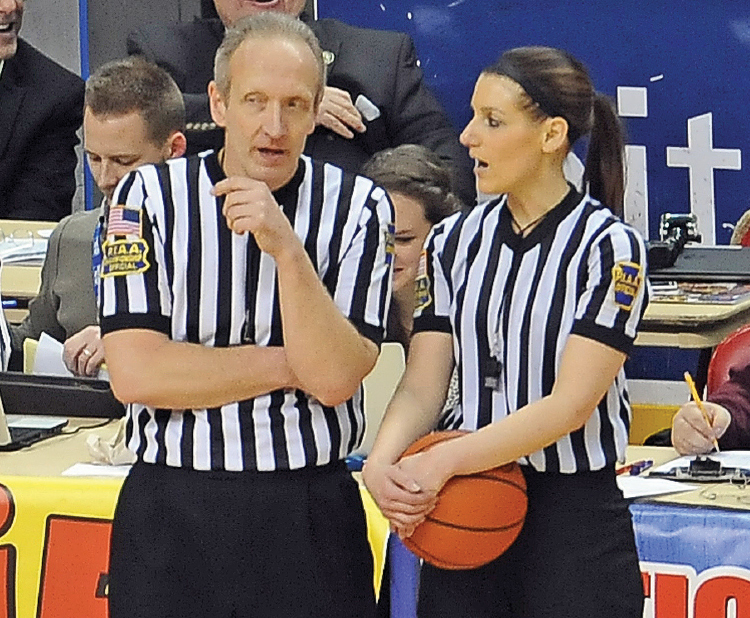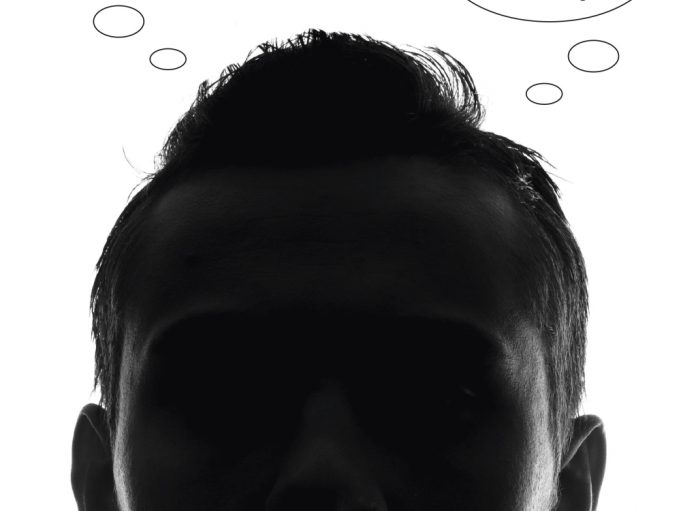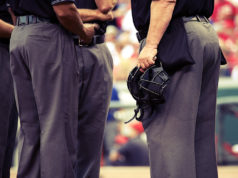A
s a longtime NCAA Division I college women’s basketball official, Mark Zentz says there’s a surefire way for him to know when he’s blown a call.
“When you see it replayed on the video board, you’ll know it,” he said, laughing.
Of course, not all officials are in the same boat as Zentz. Unless you’re a major college official or in the professional ranks, you likely don’t have to worry about seeing your every call shown on the big screen.
But one situation all officials have to deal with — whether they’re a head linesman in the NFL, an umpire in the Big Ten or a referee in a youth basketball game — is how to handle blown calls. More specifically, their own.
How an official deals with those inevitable mistakes can go a long way in determining how good an official he or she can be.
“Failure is part of the game, mistakes are part of the game,” said sports psychologist Michael Edger. “Nobody is perfect, so it all has to do with managing expectations and focusing more on effort than results.
“If you go out there whether you’re an official or an athlete and give 100 percent and you know you gave 100 percent — you were prepared mentally for the game, you did your homework and know the rulebook — and then you make a mistake, that’s just part of the game. You have to let it go.”
That can be difficult, though, when fans, players and coaches view officials in a different light. They often aren’t so forgiving.
“It’s unfortunate but the perception of officials is that we must show up perfect and get progressively better,” said college football official Reggie Smith of the axiom often used to describe officiating. “We’re the only ones where that perception applies.”
Kicking a play and the aftermath that goes with it is not unlike confession at church. Consider the similarities:
The missed call itself, the recognition of the wrongdoing, the admission of the mistake and the consequences that go with it. We won’t go so far as to substitute the offended coach for a priest in comparison, but you get the idea.
Other than the video board in Zentz’s example, how do you know when you’ve made a mistake?
“We’re the first ones to know,” said Smith, who’s a referee in the Big 12 and an official in CFO West. “It doesn’t come from a parent, a coach or a player. We’re the first ones to know; you can feel it.”
Jeff Cluff agreed.
“I think as a general rule, anybody who works the high school level or varsity level on up has a pretty good internal clock and a pretty good internal evaluation system to let them know when they were right or wrong,” said Cluff, who is supervisor of officials for the Utah High School Activities Association and an NCAA Division I college baseball umpire for the Mountain West and West Coast conferences.
“That internal clock will go off, ‘Hey, did I get that right or did I not?’” Cluff said.
Building a solid reputation as someone who works hard helps when you make an error and that clock goes off.
“(Coaches) understand the nature of the beast and that bad calls are going to happen,” Smith said. “Are they a little more prone to give Reggie Smith slack versus Joe Blow? I would hope. I would hope that my reputation as being a hard worker in the past might buy me a little more leeway and they say, ‘You know what? This guy really cares and he’s not just out there to collect a paycheck. He gives a damn.’”
Officials don’t always know right away when they have made an error on a call. There are times when you won’t know you made a mistake until you get to the locker room at halftime and you hear about it from your partners or you watch game video after a game and you see it right there in front of you.
So, when you know you made an error, the next step in the anatomy of a blown call is admitting the mistake. The consensus among officials is, yes, it’s often better to fess up. But there’s a time and place to do it. And there are exceptions to the rule.
“I think it can help your credibility,” Zentz said. “Number one, we’re acknowledging we’re not perfect and we’re going to kick plays. There’s no doubt about it.
“But you have to limit that. You can’t go to a coach three times and say, ‘I kicked that play.’ That’s going to hurt your credibility more than help it. You can do that one time a game, but you better start getting your plays right.”
When to Admit a Mistake
As an official, you might feel guilty over a blown call, especially one you don’t realize until later when you watch the film, but that doesn’t mean you should pick up the phone and/or email the coach either.
There are ways to handle such a situation.
“If you want to acknowledge it, I think the best way is to go through your supervisor and let him or her present the situation to the coach,” Zentz explained. “Seeking out a coach, you don’t know how that’s going to turn out.”
Cluff agreed.
“I don’t feel the official should contact the coach, especially at the high school level,” he said. “The assigner/supervisor may have already had contact and acknowledgement is a good thing, but the gravity of the mistake makes the difference in how you and your assigner/supervisor handle it.

“If you want to say something to the coach, wait until you officiate that coach’s game again and when and if the opportunity arises, have a conversation with him or her.”
There are ways an official should diplomatically admit a mistake to a coach right away during a game if the official thinks an error has been committed. Cluff uses certain phrases that he believes can help defuse tense situations.
“I think if there’s any doubt in your mind that you missed a call in a particular situation and a coach questions your call, I think you’re better off admitting if you have any question,” he said. “I might say, ‘Hey, Coach, I may have missed that one, maybe you had a different look than I did.’ That’s a phrase I use quite a bit, but I usually always follow that up with ‘Hey, I’m working hard for you. I’m trying to get the best look I can.’
“We’re going to screw up and sometimes we have to admit we screwed up, but that doesn’t mean we’re going to go and make a public statement in the newspaper the next day.”
But even if an official wants to acknowledge a coach following a missed call, sometimes play dictates that it’s impossible to do so. Pick your spots, Zentz advised.
“Say you kicked a play and you don’t get over to that coach for another three or four minutes. Well, you don’t want to rehash old wounds and put more salt in those wounds,” Zentz explained. “If you do that, you’ll infuriate the coach.”
There are also methods of nonverbal communication, however, that work between coach and official, according to JR Salima, division coordinator for the Arizona Region Volleyball Officials.
“Volleyball’s just such a dynamic sport that the only time you’re going to get a respite is when the ball hits the ground and when it does, there’s maybe 30 seconds or so before teams are back at it again,” he said. “There’s a discreet way volleyball officials sometimes communicate more often on the regional level. I’ll tap my chest a couple of times to tell the coach, ‘Hey, that’s my bad.’ You’re owning up to your mistake and they appreciate it.
“They’ll often come up later after the match and say, ‘Hey, no big deal.’ One point isn’t going to determine the outcome, so you just keep going and that mutual respect continues.”
No Makeup Calls
You hear it all the time: “That was a makeup call.” Well, was it?
Experience can be a good teacher.
“I can remember as a younger official, especially in basketball where the game is so fast, if I made a mistake, I’d think, ‘Hey, I owe this guy one’ or ‘I owe this team one,’” Cluff said. “I can remember trying to battle with that mentally and ultimately what it does is take you out of your game.”
Salima agreed.

“If you make up calls, even in volleyball, you’re going to get a black eye that hangs with you a long time,” he said.
Some officials might think makeup calls saved them once so they go back to the well a couple of times and use it again, but from there, it becomes part of their reputation. Good officials won’t make things up just to cover for them.”
Smith added an official has too much to lose by even thinking about using a makeup call.
“I have nothing to gain by sacrificing my credibility by going out of my way to make it up to a team by making another incorrect call,” he said. “Not only will you lose credibility with the fans who automatically assume the next call will go in the opposite direction, but you really lose credibility with the coach. Two wrongs don’t make a right, especially in officiating.”
Talk to Your Partners
Officiating can be a lonely profession, but it helps to receive feedback from fellow officials whether it comes at halftime of a contest, immediately after the game or at a postgame meal. That sounding board is a way to make sure the same mistakes aren’t repeated.
“I think the people it’s toughest to admit we were wrong to is our partners,” Cluff said. “In baseball, the first thing we do when we get back to the locker room is to have a 30- to 40-minute breakdown of the game.
“And you offer criticism of each other’s game. Hopefully, it’s not that long, but it can be: ‘Hey, what do you think?’ ‘What did you see or what do you have for me? How consistent was my zone throughout the game?’ They’ll usually offer: ‘I think you’re solid,’ or ‘I thought in the seventh inning you let a couple of close pitches with the bases loaded go.’
“That’s the hard part to acknowledge — ‘Yeah, I think that one was down and I called it a strike.’”
In Smith’s position, his crew tries to rectify the mistake as soon as possible. He takes advantage of TV timeouts to correct errors.
“It might not even wait until halftime,” Smith said. “We work on the premise that in order to be a strong crew of eight officials we really need eight individuals who can do their job.
“
If everybody is responsible for one-eighth of the pie and if everybody is doing their job and we’re accountable to one another, then it’s a lot easier to go by someone and say, ‘You know what, mechanically, you did X when we need you to do Y or you did this or you did that,’ but it’s always in a way that’s academic.
“I’m not going to beat up a guy, and certainly, I wouldn’t want to be beat up over a call. But anytime with a bad call, you know you’re going to have to face a dose of medicine somewhere along the line for it, whether it comes in the postgame evaluation or whether it comes in the form of getting your chops busted by a crewmember or you’re on the receiving end of a phone call from the supervisor.”
OK, you blew a call. What are you going to do now?
- A. Mope.
- B. Think about it for a while.
- C. Forget about it and move on with the game.
Obviously, C is the correct answer, but that’s easier said than done. What’s the best way to put the error behind you and get back in the game?
“We use the three Rs for refocusing in athletics,” explained sports psychologist Michael Edger. “Recognize that your mind isn’t in the right place or that your head’s not in the game. Regroup and refocus: What do I need to do in the present moment to be doing my job or what do I need in the present moment to perform this task successfully? So move on to the next play. Recognize, regroup, refocus.
“Take a deep breath. … Think about the good call you made earlier in the game.”
Mark Zentz, a veteran NCAA Division I women’s college basketball official who worked the Final Four in 2013, likes to recall what a former supervisor once told him about blowing a call.
“He told me that even though you made a mistake, you can’t miss two in a row,” Zentz said. “If you’re looking to move up in the officiating ranks, that’s one thing they look for … how quickly you reset and go on to the next play. The quality officials can do that.
“I just try to have a short memory. You have to go on. You might say to yourself, ‘Don’t miss two.’ That’s what I do. If I think I missed a call, I’ll just say to myself, ‘Don’t miss two.’”
Jeff Cluff, supervisor of officials for the Utah High School Activities Association, says it’s OK to talk to yourself as well. In fact, he encourages it when circumstances require it.
“I talk to myself verbally (not out loud),” he said, “but I’m telling myself to refocus. ‘Let’s go, it’s another inning. I need to be my best.’
“Breathing exercises might help to calm your nerves. You have to practice getting back to your normal state of officiating. That’s just as important … the mental aspect. It might be something as small as looking at a partner for a nod, thinking about your kids at Disneyland, I don’t know, whatever it is that works.”
If Big 12 football official Reggie Smith knows he just blew a call, he immediately likes to wipe the slate clean.
“I have a word I use to help me reset, sort of like doing a soft reboot on your computer,” Smith explained. “I use the word ‘veto’ to clear my mind, to wipe out everything from that last play. Using that trigger word helps me dig in and refocus on the job at hand.
“While it (the mistake) might linger for a play or two, I think when you’re conscious that you need to get back at it, the sooner you’re able to do that the better off you’re going to be able to recover.”
Let It Go
Some officials can shrug off blown calls easier than others. It’s the same with athletes. Some can bounce back quicker and regroup.
“It is a bigger deal for some people than others,” Edger explained. “If it is, you have to think about why it is a bigger deal. Is it a bigger deal because you’re hearing crap from the fans or is it a big deal because you feel guilty?
“There will be games where you’ll make every call, but some games, most games, you’re not. So you need to be confident that at the time when you’re in that moment when you made that call, your best intentions were put forward and that’s all you can do.”
Zentz said it’s crucial for an official to have a short memory. If he doesn’t, more blown calls are likely.
“The next play is just as important as the one you possibly just missed,” he said. “Actually, as a veteran official, you learn that next play is even more important than the one you just missed.”
It makes it even harder for an official today, Smith said, when TV focuses on the reaction of coaches and fans after a questionable call.
“Whenever you see a call that’s obviously missed, the cameramen are looking at the reaction of the coaches, the players and fans who are in disbelief,” he said. “You have to be thick-skinned and move on.
“But you can’t 100 percent say that a bad call is behind you. I think any official who says, ‘Well, I blew it’ … Five plays later or 10 plays later, it’s still going to be with you. That’s just part of being human, but you have to reset and continue to officiate.”
Yes, mistakes are going to happen.
But Zentz says there is one time during a contest where an official absolutely, positively doesn’t want to blow a call.
“The one time you don’t want to kick a play is when it’s a game-decider,” Zentz explained. “When the clock gets under two minutes or one minute, you just try to take high certainty stuff and that’s when you don’t want to kick a play. You just have to raise your concentration level and prevent those game-deciders.
“One play in the body of the game may not make the difference in the outcome but in those last few waning seconds and you have to make a decision for a game-decider, that’s when it gets hard.”
What's Your Call? Leave a Comment:
Note: This article is archival in nature. Rules, interpretations, mechanics, philosophies and other information may or may not be correct for the current year.
This article is the copyright of ©Referee Enterprises, Inc., and may not be republished in whole or in part online, in print or in any capacity without expressed written permission from Referee. The article is made available for educational use by individuals.

















